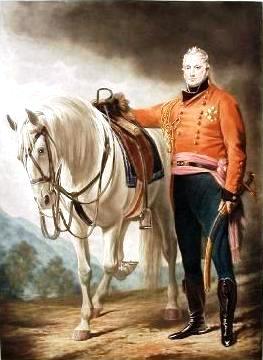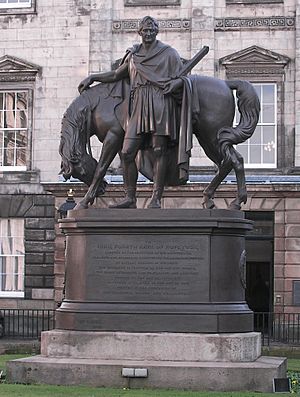John Hope, 4th Earl of Hopetoun facts for kids
Quick facts for kids
The Earl of Hopetoun
|
|
|---|---|

John Hope, 4th Earl of Hopetoun
|
|
| Born | 17 August 1765 Abercorn, West Lothian |
| Died | August 27, 1823 (aged 58) Paris, France |
| Buried |
Abercorn, West Lothian
|
| Allegiance | |
| Service/ |
|
| Rank | General |
| Commands held | Ireland |
| Battles/wars | French Revolutionary Wars Napoleonic Wars |
| Awards | Knight of the Order of the Bath Captain-General of the Royal Company of Archers |
General John Hope, 4th Earl of Hopetoun (born 17 August 1765 – died 27 August 1823) was a Scottish soldier and politician. He was known by different names during his life, including The Honourable John Hope and Lord Niddry. He served as a high-ranking officer in the British Army and fought in important wars.
Contents
Early Life and Start in the Army
John Hope was the only son of John Hope, 2nd Earl of Hopetoun, and his second wife, Jane Oliphant. Sadly, his mother passed away when he was just one year old.
In 1784, he joined the army as an officer in the 10th Light Dragoons. This was the start of his long military career. He also served as a Member of Parliament for Linlithgowshire from 1790 to 1800. This meant he helped make laws for the country.
Key Military Campaigns
John Hope took part in several important military actions. In 1796 and 1797, he helped capture French and Spanish islands in the West Indies.
In 1799, he was sent to Den Helder in the Netherlands. He was involved in the Battle of Bergen and the Battle of Castricum. These battles were part of the French Revolutionary Wars.
Service in Egypt
In 1801, John Hope traveled to Egypt. He was there to accept the surrender of French forces in Cairo and Alexandria. This was an important moment in the conflict.
Leading Troops in Spain
In 1805, he became the Lieutenant-Governor of Portsmouth. He also commanded the South-West District of the army.
He led a group of soldiers during the advance into Spain. In 1809, he commanded the left side of the British army at the Battle of Corunna. When the main commander, Sir John Moore, was killed, John Hope took over the entire command.
Later that year, he led the reserve army during the Walcheren Campaign. This was another major military operation.
Later Commands and Battles
In 1812, he became the Commander-in-Chief for the army in Ireland. He then commanded the 1st Division under The Duke of Wellington. He fought in the Battle of Nivelle and the Battle of the Nive in 1813.
In 1814, he was captured while fighting the French at the Battle of Bayonne. This was a difficult moment in his career.
Later Life and Titles
From 1816 to 1823, John Hope served as the Lord-Lieutenant of Linlithgowshire. This was an important local leadership role.
In 1814, he was given the title Baron Niddry. Two years later, in 1816, he became the fourth Earl of Hopetoun after his older half-brother passed away.
John Hope died in Paris, France, on 27 August 1823.
Family Life
Lord Hopetoun married twice. His first wife was Elizabeth Hope Vere. After she passed away, he married Louisa Dorothea Wedderburn.
His eldest son from his second marriage, John, took over his titles after his death.
Monuments and Legacy
After Lord Hopetoun died, several monuments were built to honor him.
In 1824, the Hopetoun Monument was put up on Byres Hill in East Lothian. Another similar monument was built on Mount Hill in Fife in 1826.
The city of Edinburgh also ordered a bronze statue of Lord Hopetoun. This statue was made by Thomas Campbell. It was placed in St Andrew Square in 1834. The words on the statue were written by the famous writer Sir Walter Scott.
In recent years, a plaque was added to the statue. This plaque mentions Lord Hopetoun's role in stopping Fédon's rebellion. This was an uprising against British rule on the island of Grenada.
 | Audre Lorde |
 | John Berry Meachum |
 | Ferdinand Lee Barnett |


